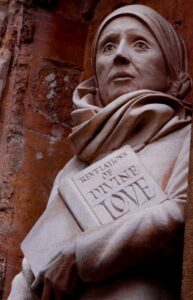Podcast: Play in new window | Download (Duration: 41:25 — 28.6MB) | Embed
Subscribe: Apple Podcasts | Spotify | Amazon Music | Android | Pandora | iHeartRadio | JioSaavn | Podchaser | Gaana | Podcast Index | Email | TuneIn | Deezer | Anghami | RSS | More

All Shall Be Well: A Journey Through Julian of Norwich’s Revelations of Divine Love with Kris McGregor
Episode Three: The 2nd and 3rd Shewing — Desire, Prayer, and Trust in God’s Hidden Work
Summary:
In Episode 3, we explore Julian’s Second and Third Shewings, where the vision of Christ’s suffering and the image of “God in a point” draw us into a profound understanding of love, trust, and divine providence. Julian teaches that even in the face of pain and mystery, God’s presence is near, sustaining all things. We reflect on the difference between seeking and beholding, the grace of perseverance in prayer, and the assurance that God is working all things toward His perfect end. Through rich imagery and deep theological insight, Julian invites us to see that nothing is by accident—and that love is always at the center.
For other episodes in this series visit: All Shall Be Well: A Journey Through Julian of Norwich’s Revelations of Divine Love with Kris McGregor
Full Julian of Norwich Quotations Used in Episode 3:
From Revelations of Divine Love, Long Text, Chapters X-XI, trans. Grace Warrack, Methuen & Co., 1901 (PDF edition).
The Blood from the Crown — A Vision of Love in Suffering
“AND after this I saw with bodily sight in the face of the crucifix that hung before me, on the which I gazed continually, a part of His Passion: despite, spitting and sullying, and buffetting, and many languoring pains, more than I can tell, and often changing of colour. And one time I saw half the face, beginning at the ear, over-gone with dry blood till it covered to the mid-face. And after that the other half [was] covered on the same wise, the whiles in this [first] part [it vanished] even as it came.” (Ch. X)
“It is God’s will that we seek Him, to the beholding of Him, for by that He shall shew us Himself of His special grace when He will. And how a soul shall have Him in its beholding, He shall teach Himself: and that is most worship to Him and profit to thyself, and [the soul thus] most receiveth of meekness and virtues with the grace and leading of the Holy Ghost. For a soul that only fasteneth it[self] on to God with very trust, either by seeking or in beholding, it is the most worship that it may do to Him, as to my sight.” (Ch. X)
“These are two workings that may be seen in this Vision: the one is seeking, the other is beholding. The seeking is common,—that every soul may have with His grace,—and ought to have that discretion and teaching of the Holy Church.” (Ch. X)
It is God’s will that we have three things in our seeking:
—The first is that we seek earnestly and diligently, without sloth, and, as it may be through His grace, without unreasonable heaviness and vain sorrow.
—The second is, that we abide Him steadfastly for His love, without murmuring and striving against Him, to our life’s end: for it shall last but awhile.
—The third is that we trust in Him mightily of full assured faith.For it is His will that we know that He shall appear suddenly and blissfully to all that love Him.
For His working is privy, and He willeth to be perceived; and His appearing shall be swiftly sudden; and He willeth to be trusted. For He is full gracious and homely: Blessed may He be!” (Ch. X)
The Third Shewing — God in a Point
“And after this I saw God in a Point, that is to say, in mine understanding,—by which sight I saw that He is in all things.” (Ch. XI)
What Is Sin? What Is Providence?
“I beheld and considered, seeing and knowing in sight, with a soft dread, and thought: What is sin? For I saw truly that God doeth all-thing, be it never so little. And I saw truly that nothing is done by hap nor by adventure, but all things by the foreseeing wisdom of God: if it be hap or adventure in the sight of man, our blindness and our unforesight is the cause. For the things that are in the foreseeing wisdom of God from without beginning, (which rightfully and worshipfully and continually He leadeth to the best end,) as they come about fall to us suddenly, ourselves unwitting; and thus by our blindness and our unforesight we say: these be haps and adventures. But to our Lord God they be not so.” (Ch. XI)
The Rightfulness of God’s Works
“For in this time the working of creatures was not shewed, but [the working] of our Lord God in the creature: for He is in the Mid-point of all thing, and all He doeth. And I was certain He doeth no sin. And here I saw verily that sin is no deed: for in all this was not sin shewed. And I would no longer marvel in this, but beheld our Lord, what He would shew. And thus, as much as it might be for the time, the rightfulness of God’s working was shewed to the soul.” (Ch. XI)
The Sweet Deeming of God
“But in another time He gave a Shewing for the beholding of sin nakedly, as I shall tell: where He useth working of mercy and grace.
And this vision was shewed, to mine understanding, for that our Lord would have the soul turned truly unto the beholding of Him, and generally of all His works. For they are full good; and all His doings are easy and sweet, and to great ease bringing the soul that is turned from the beholding of the blind Deeming of man unto the fair sweet Deeming of our Lord God.For a man beholdeth some deeds well done and some deeds evil, but our Lord beholdeth them not so: for as all that hath being in nature is of Godly making, so is all that is done, in property of God’s doing.
For it is easy to understand that the best deed is well done: and so well as the best deed is done—the highest—so well is the least deed done; and all thing in its property and in the order that our Lord hath ordained it to from without beginning. For there is no doer but He.” (Chap XI)
God’s Pleasure in His Work
“For He made all things in fulness of goodness, and therefore the blessed Trinity is ever full pleased in all His works.
And all this shewed He full blissfully, signifying thus: See! I am God: see! I am in all thing: see! I do all thing: see! I lift never mine hands off my works, nor ever shall, without end: see! I lead all thing to the end I ordained it to from without beginning, by the same Might, Wisdom and Love whereby I made it. How should any thing be amiss?
Thus mightily, wisely, and lovingly was the soul examined in this Vision. Then saw I soothly that me behoved, of need, to assent, with great reverence enjoying in God.” (Chap XI)
Scripture Featured
(Translations used: Revised Standard Version [RSV] )
- (Luke 1:38, RSV)
“Let it be done unto me according to thy word”
Catechism of the Catholic Church
“By his Passion and death on the Cross, Christ has given a new meaning to suffering: it can henceforth configure us to him and unite us with his redemptive Passion” (CCC 1505).
“Faith is a personal act—the free response of the human person to the initiative of God who reveals Himself” (CCC 166).
“Contemplation is a gaze of faith, fixed on Jesus… It is a gift, a grace; it can be accepted only in humility and poverty” (CCC 2715).
“The desire for God is written in the human heart… and God never ceases to draw man to Himself” (CCC 27).
“God is in everything by His presence, power, and essence” (CCC 300).The Church teaches that God can permit evil in His providence—not because He wills it directly, but because He respects our freedom and knows how to draw good from it (cf. CCC 311).
“God created everything for man… but man is created to serve and love God and to offer all creation back to Him” (CCC 358).
Even when man disobeys, God remains faithful and draws good from sin (cf. CCC 410–412).
“Creation has its own goodness and proper perfection, but it did not spring forth complete from the hands of the Creator. The universe was created ‘in a state of journeying’ toward an ultimate perfection yet to be attained” (CCC 302).
Reflection Questions for Prayer
- In what areas of my life do I struggle to see God’s loving providence at work?
- How might I allow the truth that “God is in the Mid-point of all things” to reshape my response to anxiety or uncertainty?
- Do I truly believe that God never lifts His hands from His works—even when I feel abandoned or confused? How might that belief change how I pray today?
Closing Prayer (inspired by the Second and Third Shewing)
© Discerning Hearts. All rights reserved.

